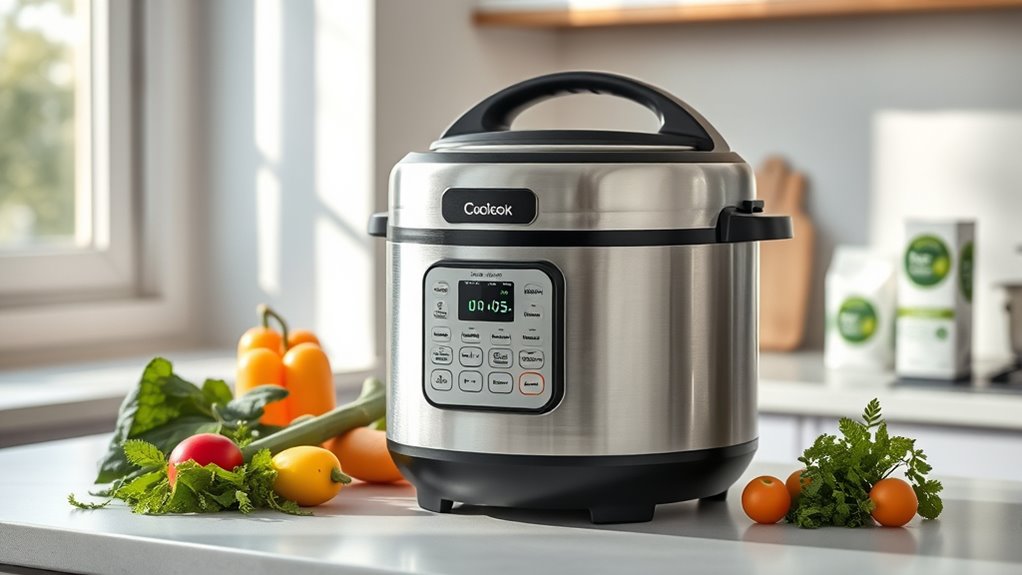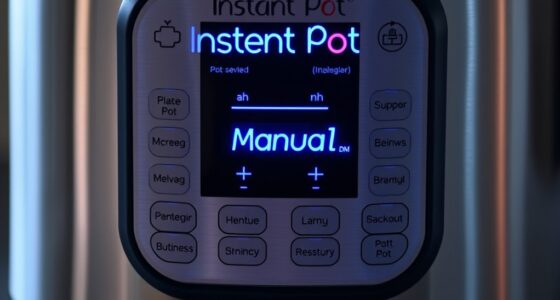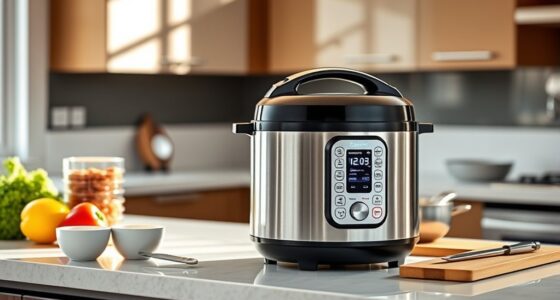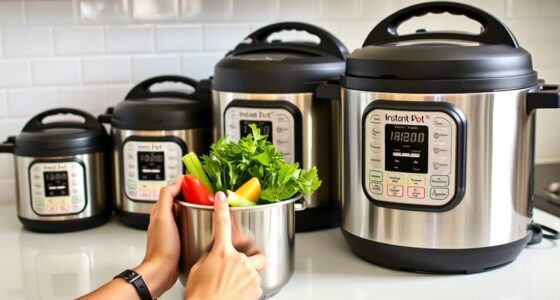Multicookers are quite energy-efficient because they combine multiple functions like pressure cooking, slow cooking, and steaming into one device, reducing the need for several appliances. They save energy by cooking faster, using precise temperature controls, and minimizing heat loss through insulation. Automatic shut-off features prevent unnecessary power use. Their long lifespan and eco-friendly designs further support sustainability. To discover how these smart devices can help you save energy and reduce your carbon footprint, keep exploring the benefits they offer.
Key Takeaways
- Multicookers consolidate multiple functions, reducing overall energy consumption compared to using separate appliances.
- Their precise temperature control and insulation minimize heat loss, enhancing energy efficiency during cooking.
- Shorter cooking times with pressure and multicook methods lower electricity usage and operational duration.
- Automatic shut-off and eco modes prevent unnecessary energy waste once cooking is complete.
- Their durable, eco-friendly designs support long-term use and reduce electronic waste, promoting sustainability.

Multicookers are becoming popular for their convenience and versatility, but many people also wonder about their energy efficiency. When you’re considering whether to add one to your kitchen, understanding its electric consumption is key. Unlike traditional appliances, multicookers are designed to optimize energy use by combining multiple functions—such as slow cooking, pressure cooking, and steaming—into a single device. This consolidation means you’re likely to use less electricity overall compared to running separate appliances like a stove, oven, or microwave. The energy used during cooking is also focused and efficient, thanks to precise temperature control and insulated chambers, reducing waste and unnecessary power draw.
Multicookers save energy by combining functions and reducing waste through precise control and insulation.
You might be surprised to learn that multicookers generally consume less energy than conventional cooking methods. For example, pressure cooking significantly cuts down cooking time, which directly lowers electric consumption. Shorter cooking durations mean the motor and heating elements operate for less time, saving electricity with each use. Additionally, many models feature automatic shut-off functions that turn the device off once your meal is ready, preventing energy from being wasted. This not only helps you save on your utility bills but also contributes to a more sustainable lifestyle by reducing overall energy demand.
From an environmental perspective, multicookers offer notable sustainability benefits. Because they’re energy-efficient, they reduce your carbon footprint by limiting the amount of electricity needed to prepare meals. When paired with the renewable energy sources in your area, this can make a meaningful difference in your environmental impact. Moreover, their multi-functionality means you’re less likely to rely on multiple appliances, which reduces the energy consumption associated with manufacturing, transporting, and disposing of those devices. This consolidation helps lower the demand for electronic waste and minimizes the resources needed to power a busy kitchen.
Another way multicookers support sustainability is through their durability and long lifespan. When you invest in a high-quality model, it can serve you well for years, decreasing the need for frequent replacements. This longevity reduces the environmental costs linked to manufacturing and disposal. Plus, many multicookers are made with eco-friendly materials and come with features that promote energy conservation, such as adjustable timers and eco modes. These options allow you to fine-tune your cooking, making sure you’re using only as much energy as necessary.
Frequently Asked Questions
Do Multicookers Save More Energy Than Traditional Stovetops?
You’ll find that multicookers use less energy than traditional stovetops because they have lower energy consumption and are more appliance efficient. They cook food faster and retain heat better, reducing overall power use. By focusing heat directly on the food and minimizing heat loss, multicookers help save energy. So, if you’re looking to cut down on energy bills and be eco-friendly, multicookers are a smart, efficient choice.
How Do Multicookers Impact Overall Household Energy Consumption?
They say “every little bit counts,” and multicookers prove that by reducing your household energy consumption. You’ll use less power compared to traditional methods, saving energy and money. Plus, they offer environmental benefits by cutting down greenhouse gas emissions. By choosing a multicooker, you’re helping to make your home more energy-efficient and eco-friendly. It’s a simple step toward a greener lifestyle that benefits both your wallet and the planet.
Are There Specific Brands Known for Higher Energy Efficiency?
When choosing a multicooker, you’ll want to take into account brand reputation and energy ratings. Some brands are known for higher energy efficiency because they prioritize eco-friendly designs and advanced technology. You can check energy ratings labels to compare models and find those that consume less power while still delivering great performance. Opting for reputable brands with strong energy ratings helps you save money and reduces your environmental impact.
Can Multicookers Reduce Electricity Bills Significantly?
Imagine your kitchen as a battlefield, and your multicooker as a secret weapon. By harnessing energy savings, you can slash your electricity bills and win the war on costs. These devices cook faster and use less power, leading to significant cost reduction over time. With smart use, you maximize efficiency, turning everyday cooking into a strategic move that keeps your wallet fuller and your energy footprint lighter.
Do Different Cooking Functions in Multicookers Vary in Energy Use?
You’ll find that different cooking functions in multicookers vary in energy consumption, impacting overall cooking efficiency. For example, pressure cooking uses less energy than slow cooking due to shorter cooking times. By selecting the appropriate function, you can optimize energy use, saving electricity and reducing your environmental footprint. Understanding these differences helps you make smarter choices, ensuring your multicooker operates efficiently and saves you money on energy bills.
Conclusion
Ultimately, choosing a multicooker gently guides you toward a more mindful kitchen. Its subtle efficiency whispers promises of conserving energy without sacrificing flavor or convenience. By embracing this eco-friendly companion, you quietly contribute to a greener planet, all while enjoying your favorite dishes. So, when you opt for a multicooker, you’re not just making a smart choice—you’re gently nurturing a sustainable future, one meal at a time.









